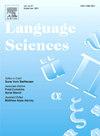失而复得的语言从模糊逻辑到尤源
摘要
在语言研究的一方,有语言学家支持语言和语言学在实践和理论上的自主性,认为 "语言学必须试图把握语言,不是将语言作为非语言现象(如物理、物理-逻辑、心理、逻辑、社会学)的集合体,而是作为一个自足的整体,一个自成一体的结构"(Hjelmslev, 1961, 5-6)。另一方面,也有研究者宣称 "语言学不需要假设语言的存在作为其理论装置的一部分"(Harris, 2003, 46)或 "如果你想学习语言,就忘掉语言吧!"(Steffensen, 2011, 46)。(Steffensen, 2011, 204)。通过采用模糊逻辑和模糊集的方法论,以及希腊和东方哲学的思想,该研究建议摒弃理论二元化,探索极端立场之间的梯度(自主与非自主、普遍与情景、真实与建构)。首先,文章进一步扩展了哈里斯和斯蒂芬森的观点,并提出了一个新的论点:"如果你想丢掉语言,那就研究它!"。其次,这项研究表明,有必要从实践和美学角度承认语言的真实性(例如在教育中)。为了证明第一点,即寻找语言实体的理论努力是空洞的,研究引入了模糊逻辑的思想,对语言研究中的现实主义、概念主义和唯名论进行了批判性的修正。这项工作提供的证据表明,无论是 "语言 "还是 "方言 "或 "特选语种",都无法在实践中找到,因为这些明确的分类所 "描述 "的语言事实(系统)本身就具有模糊性。有人认为,为描述与语言有关的现象而设计的理论和概念是一种理论建构,并不能完全捕捉到语言的随机性和动态性。相反,它们只是建构或声明了语言的现实,类似于我们创建星宿的方式(Steffensen and Fill,2014)。这与禅宗和道教的思想不谋而合:"命名它,你将失去它"。该研究还认为,即使 "语言 "是 "特选语、社会选语、方言等的集合体--而非实体本身"(Hazan, 2015, 11),我们也无法在实体或构成假设实体的元素(集合体)中找到其存在的象征。文章的结论是,那些关注语言特殊性的研究者失去了语言的复杂性;反之,那些囊括各个方面的研究者(如整合方法)则失去了语言的实体。然而,如果我们无法从理论上把握语言的真实性,这是否意味着语言没有任何真实性,研究者和学习者就无法对语言有任何积极的认识?文章提供了一些支持语言现实性的类比(与音乐、道路交通、星座的比较),以及基于直觉、隐喻思维和审美理解的语言理解方法。在日本文化中,通过渋い、侘寂和幽玄等美学范畴,可以找到这种直觉观察的例子。因此,文章提出了可持续生态语言学的观点,将语言教学中的常识现实主义和 "语言研究中的非科学印象主义"(引自 Steffensen, 2011, 204)纳入了整合方法的范畴。On the one side of the language studies, we have linguists who support the practical and theoretical autonomy of language and linguistics and argue that “linguistics must attempt to grasp language, not as a conglomerate of non-linguistic (e.g., physical, physio-logical, psychological, logical, sociological) phenomena, but as a self-sufficient totality, a structure sui generis” (Hjelmslev, 1961, 5–6). On the other side, there are researchers who declare that ‘‘linguistics does not need to postulate the existence of languages as part of its theoretical apparatus’’ (Harris, 2003, 46) or “if you want to learn about language, forget about language!” (Steffensen, 2011, 204). By resorting to the methodology of fuzzy logic and fuzzy sets, ideas of Greek and Eastern philosophy, the research suggests moving away from theoretical binarisation and exploring gradients between extreme positions (autonomous vs heteronomous, universal vs situated, real vs constructed). First of all, the article extends further the ideas of Harris and Steffensen and introduces a new thesis: ‘if you want to lose the language, study it!’. Secondly, the research demonstrates the need for the practical and aesthetical acknowledgment of the reality of language (e.g., in education). To prove the first statement, the emptiness of theoretical efforts to find the entity of language, the research brings into play the ideas of fuzzy logic and critically revises realism, conceptualism and nominalism in language studies. The work provides evidences that neither ‘language’ nor ‘dialects’ or ‘idiolects’ can be found in practice due to the inherent fuzziness of the linguistic facts (systems) ‘described’ by these clear-cut categories. It is argued that theories and concepts designed for the description of the language-related phenomena are theoretical constructions that do not fully capture the stochastic and dynamic reality of language. Instead, they merely construct or declare it, similar to how we create star constellations (Steffensen and Fill, 2014). It resonates with the idea that can be found in Zen Buddhism and Taoism: “name it and you will lose it”. The research also holds that even if ‘language’ is an “ensemble of idiolects, sociolects, dialects and so on – rather than an entity per se” (Hazan, 2015, 11), we cannot find a token of its existence in either the entity or in the elements (ensemble) constituting that hypothetical entity. The article concludes that those researchers who focus on the particular nature of language lose its complexity; conversely, those who embrace all aspects (e.g., integrational approaches) lose its entity. However, if we are not able to grasp theoretically the reality of language does it mean it has no reality whatsoever and researchers and learners cannot have any positive knowledge about the language? The article offers some analogies in favour of the reality of language (comparison with music, road traffic, star constellations) and methods for its understanding based on intuition, metaphorical thinking and aesthetic comprehension. An example of such intuitive observation can be found in Japanese culture through such aesthetic categories as shibui 渋い, wabi-sabi 侘寂 and yūgen 幽玄. As a result, the article proposes the idea of sustainable ecolinguistics that includes in the body of integrational approaches the phronesis of common-sense realism in language teaching/learning and “unscientific impressionism in language studies” (quoted from Steffensen, 2011, 204).

 求助内容:
求助内容: 应助结果提醒方式:
应助结果提醒方式:


